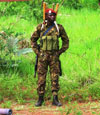
Unconfirmed reports that a leader of rebel group from the Central African Republic, or CAR, recently traveled to Khartoum are troubling. The self-proclaimed “General” Damane Zakaria, the de facto leader of the UFDR rebel group (known by its French acronym for the Union of Democratic Forces for Unity), is believed to have met with Sudanese leaders in Khartoum. While it is unclear what Damane is talking about with the Sudanese, it is likely that the issue of the Lord’s Resistance Army will feature strongly in his agenda.
The UFDR gained prominence in October 2006 when the rebel group attacked and took control of the town of Birao in the northeast of CAR. In the aftermath of the attack, CAR President Bozize accused the Sudanese government of Omar al-Bashir of being behind the UFDR, a charge Khartoum denied. In April 2007, Bozize’s government signed a peace agreement with the UFDR. Ever since, the rebel group has been relatively quiet, at times even cooperating with the CAR national army, the FACA.
In the last three years most UFDR fighters – a reported 1,200 strong at their peak –settled in Vakaga prefecture in the northeastern corner of CAR, abutting Sudan’s Darfur region. In March 2010, the mayor of Sam Ouandja told Enough that UFDR fighters were mostly based in the towns of Sam Ouandja, Bria, and Ouanda Djallo and involved mostly in farming as well as artisanal diamond and gold mining. A handful of fighters remained active, engaging mainly Sudanese poachers who hunted elephants in the Yata Ngaya forest. On September 5, 2010, however, it was reported that UFDR fighters responded to an LRA attack on the town of Ouanda Djallo, killing nine LRA fighters and rescuing over 40 people who had been abducted by the LRA.
The proximity of the LRA to UFDR fighters, especially given their supposed common backer in Khartoum, concerned many, including the Ugandan army, which sent troops to Sam Ouandja early in 2010. But UFDR’s acceptance of Ugandan soldiers coupled with their active hostility towards Sudanese poachers (often referred to as Janjaweed and believed to have the support of Khartoum) – who the Ugandans claim were responsible for killing 18 Ugandan soldiers at the end of May 2010 – allayed fears of the UFDR being supported by Bashir’s government. The alleged UFDR attack against the LRA was seen as further evidence to refute the claim that the two rebel groups sought to cooperate through Khartoum’s mediation, a theory explained to Enough by one of Kampala’s top security officers as early as February 2010.
However, Damane’s alleged visit to Khartoum has caused regional analysts to suspect that Bashir’s government is building alliances of proxies. Southern Sudanese officials fear that Khartoum will support any external forces willing to destabilize South Sudan in the run-up to the referendum of January 2011. The theory goes that the LRA will be used, as in the past, to attack southern Sudanese forces in return for military support from Khartoum. Damane might seek to revive UFDR’s original demand of removing President Bozize who is running for re-election in CAR’s presidential election scheduled for early next year.
A potential cooperation between the ruthless LRA and the UFDR – a well trained group of fighters armed with G3 machine guns and rocket propelled grenades – would be catastrophic for the region and most worryingly for the region’s civilians. Here’s hoping that U.S. Special Envoy to Sudan Scott Gration makes tracing and ending Khartoum’s support to any forces such as the LRA or the UFDR a top priority in his agenda.
Photo: A FACA soldier in CAR (Enough/Ledio Cakaj)

